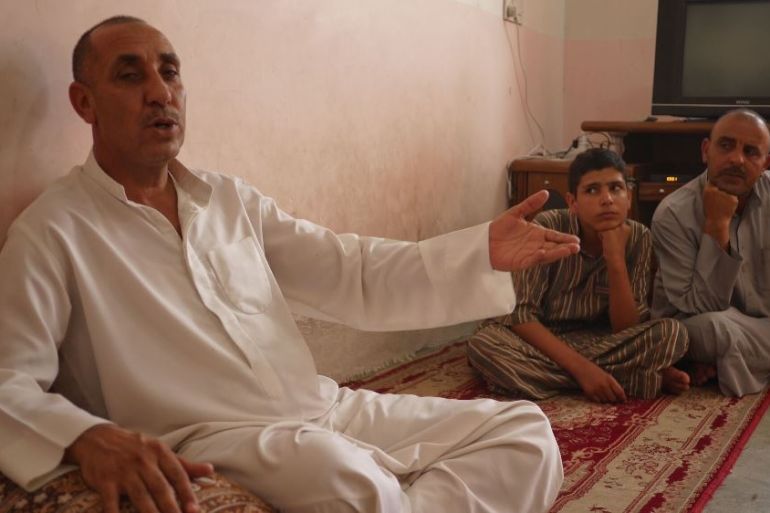A year of ISIL: ‘There is no future for Iraq’
Displaced Sunnis say they are ready to fight to win their land back, but the central government is not helping them.

Kirkuk, Iraq – When fighters with the Islamic State of Iraq and the Levant (ISIL) began threatening his life if he failed to pay a $500 monthly bribe, Abu Ahmed knew it was time to leave home.
“I refused, and they said, ‘We will kill you,'” Abu Ahmed, who spoke under a pseudonym out of fear for his family’s safety, told Al Jazeera.
Abu Ahmed, 63, is among thousands of Sunni residents who fled the Hawija district of northern Iraq after ISIL overran it one year ago. His home was converted into an Islamic court, and he now lives in neighbouring Kirkuk city, sharing a modest home with more than a dozen family members.
|
|
Perched on a thin mattress laid atop the concrete floor, Abu Ahmed described how ISIL cemented its grip on Hawija’s residents through fear.
“If you don’t join them, they kill you directly,” he said. “To save your life, you will tell them, ‘I am with you.'”
OPINION: Kirkuk foreshadows challenges for a post-ISIL Iraq
Residents in the Sunni stronghold of Hawija have long opposed the Shia-led Iraqi government, citing systemic discrimination and a litany of abuses against Sunnis by security forces.
Two years ago, deadly clashes erupted in the district after Iraqi security forces raided a protest camp where Sunnis were demonstrating against former Prime Minister Nouri al-Maliki.
It was this antipathy towards the ruling regime that prompted many Hawija residents to initially welcome ISIL’s advance in June 2014, Abu Ahmed said. They expected a “revolution”, he recalled.
“But then everything changed,” Abu Ahmed said, noting ISIL soon exhibited tactics similar to the Iraqi army – storming homes and assaulting residents to settle vendettas.
The government didn't give us any weapons to defend ourselves… We repeatedly asked for weapons from the Iraqi government, but they never responded to our demands.
“The army under Maliki used to treat us all like terrorists, and today there is no government. It is a militia. It is no different from ISIL,” Abu Ahmed said.
“There is no future for Iraq, no future at all.”
Hasan Mahmoud Sofi, a Hawija-based commander of the Sahwa (Awakening Council) that years ago helped the Iraqi government and US troops fight al-Qaeda in Iraq, echoed Abu Ahmed’s sentiments.
Sofi, who also fled Hawija after ISIL’s takeover, said the district is now suffering from critical water and electricity shortages, as well as a lack of jobs.
Sitting with fellow Sahwa members on the floor of his home in the heart of Kirkuk, Sofi said they want to fight to win Hawija back, but lack the necessary tools.
“The government didn’t give us any weapons to defend ourselves… We repeatedly asked for weapons from the Iraqi government, but they never responded to our demands,” Sofi told Al Jazeera, noting the Hawija-based Sahwa are best positioned to drive ISIL out of that territory. “You need to know the area to win the war.”
Kemal Kirkuki, the Peshmerga commander for western Kirkuk, warned against arming the Sahwa, suggesting the group could become “ISIL in another form”. The Peshmerga have been making gains in the battle against ISIL, controlling strategic oil and water reserves in the area, he told Al Jazeera.
Yet even as ISIL fighters in Hawija have suffered setbacks in recent days, with dozens reportedly killed after anti-ISIL air strikes last week targeted a warehouse in the district, Kirkuki said the group has been pushing every day to try to expand its reach.
![Kirkuk Commander Kemal Kirkuki says the Peshmerga have been making gains in the battle against ISIL, controlling strategic oil and water reserves [Megan O’Toole/Al Jazeera]](/wp-content/uploads/2015/06/a69fdda601e2457baa3ec35ea638e734_19.jpeg)
BLOG: An illusory calm along Kirkuk’s front line
Meanwhile, Colonel Idriss Rifaet of the Asaish of Kirkuk, a Kurdish security force, cited growing concerns about the influx of internally displaced persons (IDPs) into the Kirkuk area.
“They are coming daily; we cannot stop them,” Rifaet told Al Jazeera. “The main problem for us is that even when ISIL is pushed out, the IDPs are staying here and not going back.”
Rifaet says security forces believe there are sleeper cells among the IDP population, although he could not estimate how many.
As for the danger from neighbouring Hawija in particular, Rifaet notes that the trouble there began brewing long before the ISIL invasion.
“They are ex-Saddam people,” he said, “and they think Kurds are their enemy, coming to control their lands.”